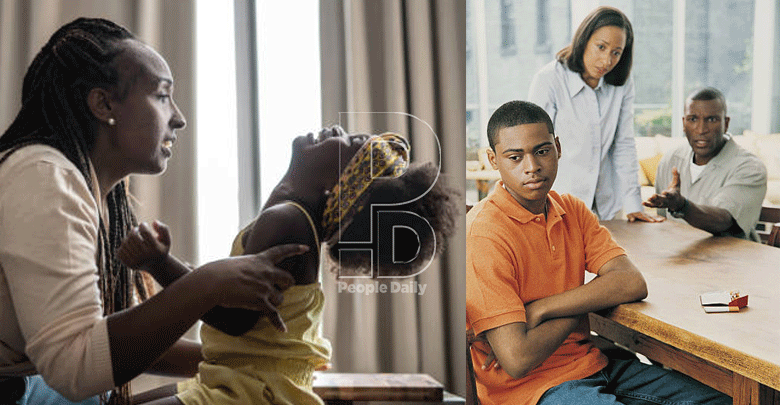Should you discipline your children differently?

While you don’t need to raise your little ones completely different, your teaching methods should vary a bit and be tailored to their specific needs.
Disciplining a single child is a relatively straightforward task if you have a time-out spot, a willingness to talk, and some patience. But once a family expands, discipline gets an audience.
Any parent who has more than one child knows that siblings can have different personalities.
And the discipline strategies that work well for one child may not work as well with another.
Diana Makokha, a mother of two boys aged 18 and six years says she chooses to discipline them according to their age.
“My children have a wide age gap of 12 years. For my 18 year old boy, I am glad that we are great friends and mostly, we have discussions on how things should or shouldn’t be done,” says Diana.
As for the six-year-old boy, once in a while, Diana uses the cane. “He is a temperamental boy as compared to his big brother,” she says.
Nanjinia Wamuswa, a father of three children aged 14, 12 and seven says discipline is not a one size fits all for his children.
“The best way to discipline children is doing it immediately they are found to have done a mistake.
If you wait to discipline them later, they might not get it why they are being punished or corrected, and I think this works differently because of age,” says Namuswa.
What works
“While the big boys might relate when disciplinary action is taken against them later, the young girl might not understand hence I discipline her immediately she commits a mistake.
For my older boys, when they do something wrong, they will be waiting for some form of punishment that they know may come even at a later date.
Just like when we were children, you would make a mistake when your parent was not around, and in your mind you just knew that when he or she returned home, the first thing will be for them to deal with you,” he explains.
He doesn’t use the cane on his boys as a way of disciplining them since he considers them big enough after they underwent circumcision.
But for his young daughter, he does use the cane, but on rare occasions as a last option just to scare and let her know that she can still be beaten if she does something wrong.
“Withholding presents or visits to relatives or friends in the neighbourhood works for the big boys.
I realised that when you withhold something children treasure most, and especially if it’s due to their mistakes, they will be forced to adjust their behavior just to have it,” he says.
Caroline Bongo, a mother of seven children believes in Godly discipline, ‘Spare the rod spoil the child’.
Nevertheless, there should be a balance to ensure that in disciplining children, parents do not end up abusing them.
“Children at whatever age (even a toddler) have the capacity to push their boundaries to see how far they can get.
But they need to know clearly who is in charge. When we miss this and they start calling the shots, we know the balance has tipped,” says Caroline.
Caroline believes in total democracy and hearing a child’s side of the story. She opines: “Between my husband and I, he is the disciplinarian, and initially we had a lot of conflicts on how to discipline the children.
Nevertheless, I must admit that the methods of discipline are not the same for each child.
One is really afraid of the cane while another, you can cane, but it won’t change anything.
It will just leave them wounded, broken and probably even more rebellious. Discipline must never become a punishment.
While punishment focuses on making a child suffer for breaking the rules, discipline is about teaching them on how to make a better choice next time.
We depend a lot on God in issues where we have no clue of what to do. After all, He is the one that holds their user manual.”
It is a process
Catherine Musyoka Amulundu, a clinical psychologist says discipline is the process of helping your child learn.
“Having a warm and loving relationship with your child is a prerequisite to a successful disciplining process.
Discipline is not the same as punishment. Discipline strategies are positive and are built on good communication between a parent and the child,” says Amulundu.
According to her, the underpinning principle in discipline is ‘firm and fair’. “Communicate consistent behaviour whether at home or out in the community. Have family values, which are emphasised all the time.
Lead by example since children learn by observing and modelling behaviour from those around them.
Set consequences for unacceptable behaviour and be consistent in effecting them.
Recognise and reward acceptable behaviour and this may be by praising and affirming the child.
Ignore disruptive behaviour, which is meant to get your attention unless a child is doing something dangerous.
Finally, listen and understand your child. Children love their parent’s attention so be available to them,” explains Amulundu.












